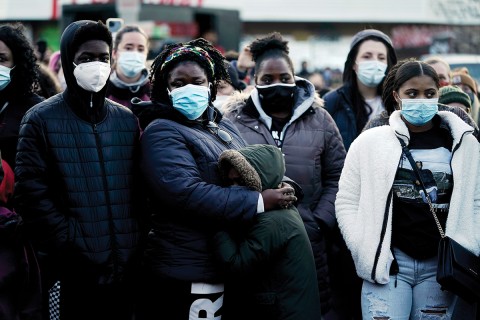What kind of justice did Derek Chauvin’s trial achieve?
The verdict of a court is not the final verdict of a society.

When a Minnesota jury handed down guilty verdicts on all charges against Derek Chauvin on April 20, the primary legal battle over George Floyd’s death was brought to a clear and fitting conclusion. But ever since the shocking video of that killing became public last May, its meaning and the requirements of justice in responding to it have been the subject of controversy and clashing interpretation that no jury could conclude. “I would not call today’s verdict justice,” Minnesota attorney general Keith Ellison said after the verdict, because justice “implies restoration.” But, he continued, the verdict did produce “accountability, which is the first step towards justice.”
In what sense, if any, was justice done in this case? And what steps toward justice lie ahead?
Some elected leaders looked for catharsis in the result, sometimes to the point of becoming obtuse and macabre. “George Floyd came to Minneapolis to better his life,” said Minneapolis mayor Jacob Frey, “but ultimately his life will have bettered our city.” At least Frey did not go as far as House Speaker Nancy Pelosi, who literally thanked the late Floyd “for sacrificing [his] life for justice.”
Read our latest issue or browse back issues.
Others cast doubt on the justice of the verdict altogether. On Fox News, Tucker Carlson suggested without evidence that the jury’s decision was provoked by activism and agitation outside the courtroom. This was a common theme on the right in the immediate aftermath of the trial. Ben Shapiro claimed that a trial for murder, as opposed to manslaughter, would not even have taken place were it not for intimidation by activists and politicians. Other commentators on the right complained about the process or insisted that Chauvin, or America itself, had been wrongly convicted of racism.
These claims were so luridly disproportionate to the facts of the case as to suggest that no one making them wanted to think about Floyd himself any more. He did not “sacrifice” his life, and to describe his senseless murder in that way both misuses his suffering and overstates the degree to which it’s led to any real progress. The jury did not err or buckle to outside pressure; anyone who claimed as much did not want to look directly at the mountain of evidence in the trial.
Justice of a certain kind was done in Minneapolis. In the limited sense of giving to a person what they are due, justice was done for Chauvin himself. In our customary usage, “justice” is an optimistic and aspirational term, enveloping equality, dignity, and the provision of whatever someone has been wrongly deprived of. But punishment is part of justice, too. A society can’t exist without exacting some kind of cost from people who consciously and maliciously break its common rules. Impunity is as much an injustice as stolen wages or voter disenfranchisement. A society that will not impose serious penalties on people who act as Chauvin did, in official capacity and in full sight of bystanders and the whole world, is not trying to be a society at all. It is content to be a battlefield.
Beyond the horrifying specifics of the case, that was the even more horrifying political and psychological question at stake in the trial: Would the high wall of impunity surrounding policing in America, especially in its interactions with Black Americans, prove to be too high even for the devastating evidence on display?
In the end, that wall of impunity was not high enough to deny such a perpetrator the justice of consequences. In this particular instance, with the massive application of prosecutorial resources, a large number of still-shocked eyewitnesses, the testimony of the police chief, and video that simply couldn’t be denied, justice in the bare sense was served.
And for Floyd himself, the jury provided a measure of vindication. When the Minneapolis police announced his death, they did so in the form of a cover-up. When I wrote about the case last May , it was with the expectation that the official attempt to ascribe Floyd’s death to “underlying health conditions” could very well succeed. The dead are not safe; they are not inevitably vindicated by history. There was a serious attempt even before the trial began to blame Floyd’s death on fentanyl, heart disease, “excited delirium,” or his own intransigence. A Christian commentator as notable as Rod Dreher jumped on these possible explanations, insisting that Chauvin and the other officers would be, and as a legal matter should be, in the clear.
While it took the guise of a factual dispute, this proved to be one last effort to claim an enemy body on the battlefield—to weave a patently wicked state action into a narrative of official and national innocence on one hand and perennial Black culpability on the other. Absent the video and the legion of local, official, and expert witnesses, it may even have worked.
It didn’t; the people of the jury decided otherwise. They weighed what they saw and heard, including a competently lawyered-up version of the arguments developed in official whitewashings and online sewers, and they decided that George Floyd had not had a fatal health episode while coincidentally pinned under an officer’s knee. They did their job, and those of us who feared that it would not even come to that, or that the wall of impunity would simply be too high, were grateful to be proven wrong.
But the verdict of a court is not the verdict of society. Consequences for the guilty do not exhaust the requirements of justice for the victim. And the vindication of one individual is nothing more than that; it rescues no one else. Whether and how this particular crime is remembered is still being decided.
The politicians and commentators who found it untenable to condemn Derek Chauvin have moved on. They are proposing and passing laws that will criminalize protest and legalize vehicular assault on protesters. The tentative moves toward police reform that gained traction on the right in 2020 have ended, replaced by scary messages about critical race theory and the slogan “defund the police.”
Among liberals, racial justice advocacy has moved on as well. A movement that began with a close focus on reforming law enforcement and making it democratically accountable quickly spread out to workplace trainings, school curricula, and any other terrain where the cultural power of contemporary racial liberalism could evade the political power of racial backlash. Some cities and states have made limited attempts at reforming law enforcement practices and accountability. In some places, attempts have been made to chip away at residential segregation through better housing policy. But in the shadow of the Chauvin conviction, American politics seems to be retreating from any shared outrage about what happened on that Minneapolis street corner and its deeper collective roots into our own places of strength. We are at risk of inviting only the arguments we think we can win in the venues we expect to dominate.
Writing about the killing of Floyd last year, I was haunted by the words of Walter Benjamin, that “even the dead will not be safe from the enemy if he wins,” and his implication that the past is always in flux as the battles of the present change its meaning. For the memory of one victim there is, for now, a moment of safety, and for one perpetrator, a moment of justice. One jury in one courtroom opted for a society of laws rather than a field of combat. As Ellison said, “the cause of justice is in your hands.” Whether this verdict proves to be a forgotten exception to a terrible rule or a step toward that rule’s end is for all of us to decide.





